When French carmaking giant PSA Peugeot-Citroën announced on July 12th it was to close its major assembly plant in Aulnay-sous-Bois, a deprived suburban town just north of Paris, a ripple of fear ran through the nearby sprawling housing estates. Several, like the infamous ‘Cité des 3000’, were originally built as of 1969 to house the plant’s workers and managers and their families. But they soon became ghettos where immigrants were dumped and unemployment and poverty were rife. While recent renovation helped roll back crime, youth unemployment currently runs at around 40%, and locals are now fearful of the future once more. Rachida El Azzouzi travelled to the Cité des 3000 to meet with the local population, many of whom regarded PSA's now doomed plant as their last lifeline.
-------------------------
Aminata said the announcement by PSA Peugeot Citroën that it was to close its plant at Aulnay-sous-Bois came to her like "a blow to the head". Just days earlier, at the beginning of July, her long-unemployed husband had finally found temporary work at the plant, and she had dared to hope it might become permanent. Like others affected, Aminata heard about the plan from television news bulletins.
With six children, Aminata’s pay as an office cleaner helped the family survive on top of her husband’s unemployment benefits. Originally from Mali, she has a 19 year-old son currently serving a jail sentence for dealing in cannabis. She gets up at 5 a.m. to take the train into Paris to clean offices near Gare du Nord railway station, and struggles daily to feed and clothe her family. She goes to the colourful, cut-price market at the Cité des 3000 in Aulnay, mainly for its "unbeatable" meat and vegetable prices, but also for cheap clothing. "I can find things for my daughters for less than five euros, even for one euro if I look hard," said Aminata, who lives on an adjoining estate.
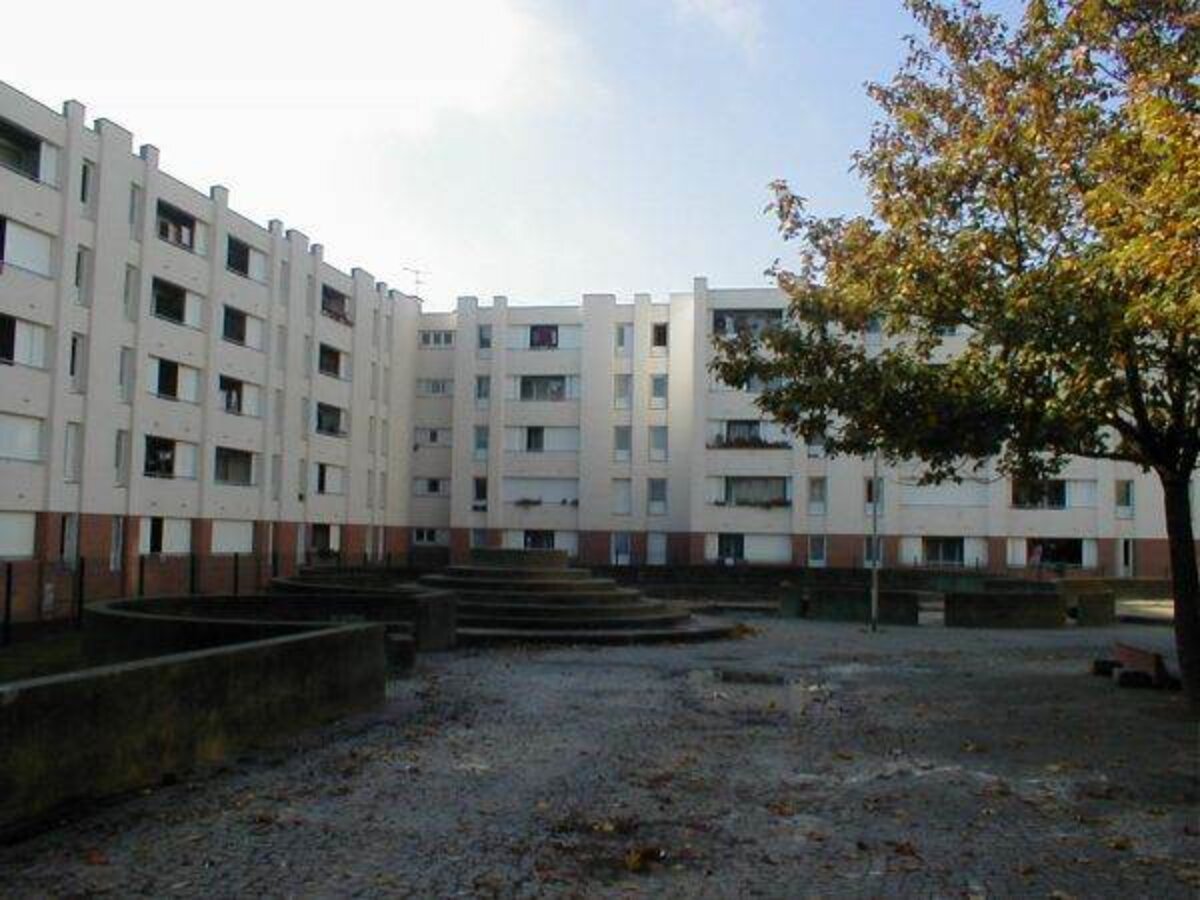
Enlargement : Illustration 1

Her friend Khadija now fears for her 51 year-old husband’s future. "He has only ever worked at Citroën, he doesn’t know how to do anything else, he has no qualifications,” she explained. They cancelled their holiday to their native Morocco this summer "to save money, just in case". She can hardly believe the factory will really close.
Beginning in 1969, the Cité des 3000 housing estate - so-called because it contains 3,000 dwellings - was thrown up hurriedly to house thousands of car workers as they arrived to take up jobs at the plant when it opened. It was built on former agricultural land, the Rose des Vents, within just several hundred metres of the gates to the Citroën factory which opened in 1973. But like many large-scale 1960s and 1970s housing projects, it became a disintegrated and dilapidated urban jungle as the more privileged moved out.
The estate is a prime example of the process, over the 1980s and 1990s, of the ghettoisation that turned socially mixed, mixed-race areas on the fringes of France’s big cities into isolated, poverty-stricken districts concentrating immigrant families with few job prospects. Unemployment among the 18-25 age group on the estate is a massive 40%, and it was the scene of major rioting during weeks of violent unrest across France’s run-down suburban housing estate areas, commonly called les banlieues, in 2005.
Around 400 families still living on the Cité des 3000 or similar neighbouring estates will be directly affected by the closure of the PSA plant. Lhassan Bennour, an inhabitant of the Cité des 3000, who calls himself "an Algerian from the mountains", worked for Citroën for 36 years before retiring. "I spray-painted cars. We worked like camels. Our overalls would stick to our skin," he remembers. "It is a shock," he said, referring to the plant closure. "Everyone knows a cousin, a brother or a neighbour who works at PSA or at one of its subcontractors," he said.
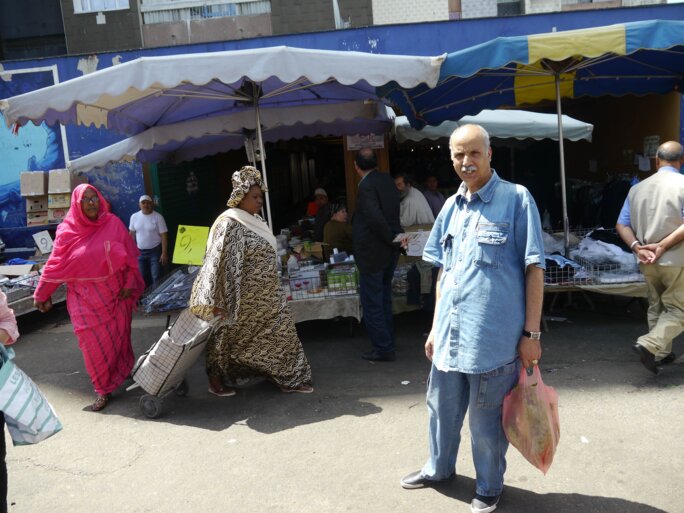
Enlargement : Illustration 2

He fears what will happen to the estate once the plant closes down. "Here, there is poverty and unemployment. PSA is the main employer in the region with Roissy [-Charles-de-Gaulle] airport. Young people haven't got work. What will become of them?" Youngsters from the département (or county) around Aulnay, Seine-Saint-Denis – the poorest in the largely prosperous Greater Paris region – frequently complain of how they suffer from the area’s negative image when they look for work as soon as they give their address.
"When they go into town they are looked upon like jackals in a flock of sheep," Bennour said. But his own children have done well – for which he says he thanks "the good God". His daughter is a teacher and his son is an estate agent. "The police never came knocking at the door," he insists.
"Before, on the 3000, it was paradise," he said. "There were flowers on the balconies, there was a mixture of social classes. When French people left in the 1980s it got worse. First North Africans and then Africans were dumped here without giving young people any work. Inevitably, criminality increased."
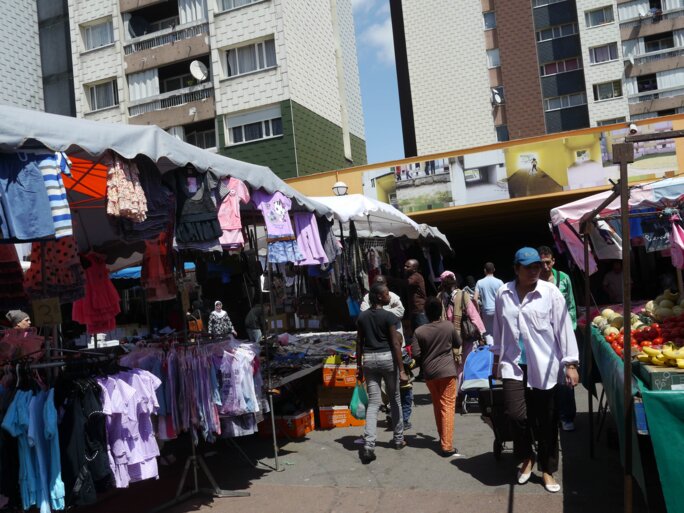
Enlargement : Illustration 3

Beginning in 2004, a vast urban renovation plan was implemented in this northern part of Aulnay, where 24,000 inhabitants, representing 30% of the town's population, live on just 4% of its area surface. The renovation included the spectacular demolition of four tower blocks in April 2010. Locals say the renovation is one of the reasons life on the estate finally improved in recent years.
"It isn't the capital of crime, crooks and dodgy dealings any more. The estate is less 'gangsta'", said Mohamed, 20, a student whose uncle and brother work for Peugeot-Citroën. He sells imitation brand-name T-shirts in the market to earn a bit of extra cash, and to avoid becoming what he called "a kid of the lost estates".
It's all over, we didn't earn much but we managed'
Yamina Merdjane, who has a stall at the market, agrees. "Delinquency is down. It's nothing like the riots in 2005," she said. She and her husband Mohand have been selling teapots and crockery here for 30 years. Two years ago they introduced an "everything at two euros" section. They went through a difficult time at the end of the 1990s, she remembers. "We never knew if there would be a fight, a hold-up or a robbery in the market." But nowadays, she says, "the youth has grown up. They are wiser, married. The thieves have become our customers".
They have fretted over the PSA plant's future for the past two years. Their own daughter is a manager at the Aulnay plant and has worked there for 14 years. "This market will die,” said Mohand. “It's not the bosses who buy but the workers." Yamina warned: "It's a time bomb. There's already enough poverty without adding to it. It's the workers who get up every morning who will pay the price."
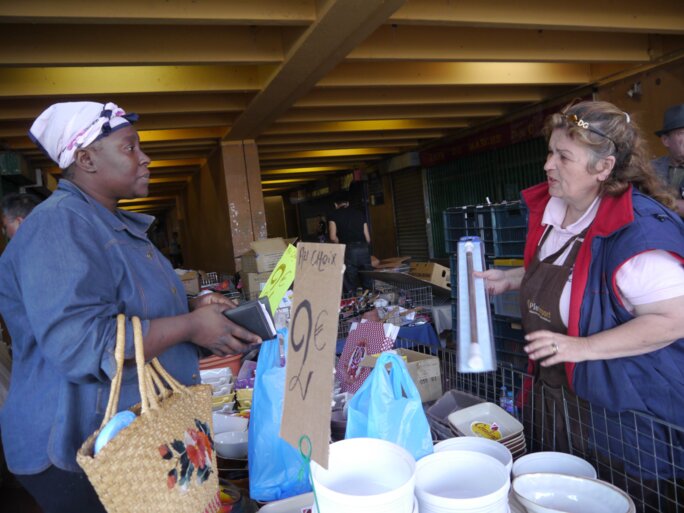
Enlargement : Illustration 4

Yamina says she knows everyone locally and is regularly invited to all the weddings on the estate. The economic crisis is visible, she says. She sees people who go hungry, people who have lost their jobs, and people who never found one or never found another one. "A lot of our customers who work for PSA are not going on holiday, so as to put money aside. It is worst for the young people, who are already suffering from the colour of their skin and the label '93'," she said, referring to the local postcode address.
Titi, one of her regular clients, is outraged. "Taking away jobs just to shift them elsewhere, that's scandalous. What is the government doing? The '93' is already known for its high unemployment and suffers from a bad reputation."
Yacine, one of the market’s many halal butchers, whose meat conforms to Moslem religious requirements, expects to lose customers. "If PSA closes we’ll be up the creek. We work with people who survive thanks to PSA, the airport at Roissy, and on benefits. For the first two weeks they can pay. After that we won't see them again."
Jamel, another butcher, knows off by heart the dates when his customers receive state benefits: family allowances on the 6th of the month and the RSA, the Revenue de Solidarité Active, the basic benefit for those with no income, on the 10th of the month. Jamel grew up on a neighbouring estate, called the Mille Mille, and observes bitterly that the sprawling estates in the north of Aulnay have become "the main suppliers of workers, baggage handlers, cleaners, of any menial jobs", in contrast to the more affluent south of the town. "Many youngsters have finished up in prison because they've been hemmed in here," he opined.
Inside the Cité des 3000 shopping centre is Nordine Diffalah's hairdressing salon. It would not be out of place in his native Jijel, a smart seaside resort in Algeria. Diffalah was finishing with Philippe, a father of six who came to France from Laos in 1976 after the Vietnam War and who has worked on the PSA assembly line for 36 years.
"At the factory everyone is shocked. It's all over for us," said Philippe. "We didn't earn much but we managed. The problem is for unskilled workers on the assembly line, like me. It won't be easy to find other work for us, unlike the technicians."
Diffalah’s cousin Abdelkrim, a retired building worker who also worked for Peugeot-Citroën for a few years in the 1980s, had dropped by for a chat. He criticised the way new immigrants were used by the company. "It took advantage of illiterate immigrants who wouldn't rebel,” he said. “When I worked for them, a minority of us spoke French, and 99% of workers didn’t know their rights." When he was offered a job as a mechanic on the assembly line he refused, preferring the building trade. "I don't like being shut indoors," he said.
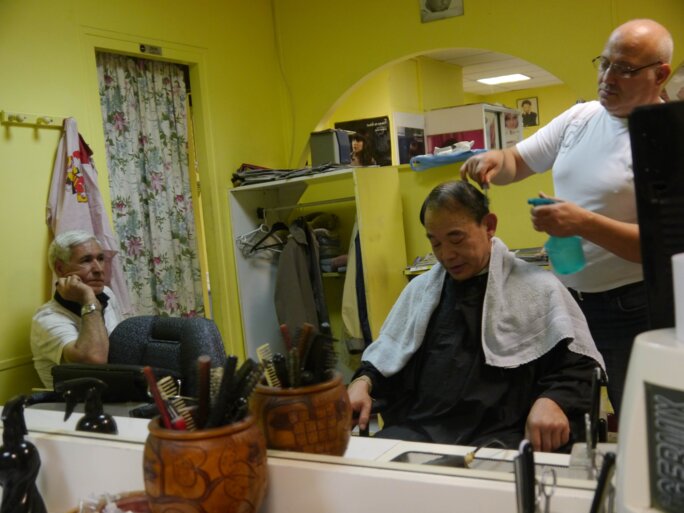
Enlargement : Illustration 5

Diffalah, a former boxer and card-carrying member of the Socialist Party who is better-known locally than the mayor of Aulnay, Gérard Segura, fears the further rise in unemployment in an area where joblessness is already endemic. Following the departure of so many among the white French population, he has lost customers amid the social changes, particularly women. He has not increased his prices for the past ten years. "Arabs and Africans only go to the hairdresser for weddings," he moaned.
'It isn’t only PSA which is in difficulty'
At the other end of the shopping centre are the premises of a branch of the Secours populaire, a nationwide charitable association dedicated to helping those in poverty. Established in 1945, it provides food and other material assistance, via some 4,000 local branches across the country, and is one of France’s principle non-profit organizations working with the poor, along with the Secours catholique and the Emmaus.
The branch in the Cité des 3000 hands out some three tones of supplies, mostly food, per month. The day Mediapart visited the branch, the volunteer workers on the premises were in an agitated state; the roof had collapsed over the weekend, the rubble piled up in front of the fridge where the stocks are kept, a water leak causing further damage. The space they occupy is a dilapidated structure, in regular deterioration. On top of that, their transport van had broken down.
“We are the last remaining spoke in the wheel,” said Charline, one of the volunteers. “For three months, we’ve been unable to work. We send those in distress to the Secours catholique, with whom we’ve made an agreement. If we stop, there are people who will die of hunger. Here, everything is rotten. The premises should have been demolished five years ago as part of the renovation scheme. We’re still waiting and the town hall doesn’t help us.”
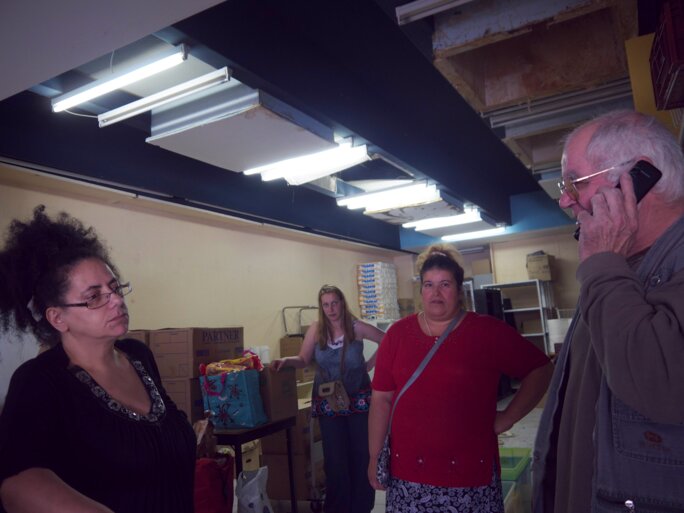
Enlargement : Illustration 6

Charline used to work as an aircraft re-fuelling agent at the nearby Roissy-Charles-de-Gaulle airport, the capital’s main airport, before giving birth to a handicapped baby. A single mother, she resigned from her job to care for the infant, and before long fell into a spiral of poverty. “I couldn’t survive financially,” she recalled. “I came and knocked on the door of the association.” That was when she met Jacques René, a retired transport worker, and his wife Annick, founders of the Secours populaire branch, and she has helped them in their work at the Cité ever since.
“Before the announcement of the closure of the PSA [Aulnay] factory, we used to have more than 65 families coming to collect packages of food and clothes, and for help with administrative paperwork,” said Charline. “Since July 12th, fathers, employees of PSA and whose wives no longer work, come to see us. They have already done the maths and have worked out that they won’t be able to survive if they are laid off.”
Marc Darsy, 44, is one of the few white faces in the neighbourhood. He has worked for PSA for 16 years, beginning as a short-term contract worker. “Criminality can only prosper from the job cuts,” he commented, sipping on a mint tea at a Moroccan café, La Braise, on the local square, the Place du Galion. The café is one of the central meeting points for the chibanis, meaning ‘elder’ in Algerian, the common description for the retired North African men who fill the tables.
He rents two-roomed apartment of 44 square metres in the Cité for 450 euros per month. During a guided tour of his home, where the walls are stained with mould, he said he did necessary repair work himself because otherwise “it would take an eternity if it was down to the landlord”. He pointed out the kitchen basin, which he said he doesn’t dare tamper with “so as not to discover what lies beneath it”.
Darsy, an activist with the CGT union, France’s largest cross-trades union, moved to the area a few years back to be closer to the factory and the local CGT headquarters. “In the département [county], it isn’t only PSA which is in difficulty,” he warned. “The unions at L’Oréal fear for the closure of the production site which employs 250 people. The textile operations at Carrefour [supermarket chain] in Aulnay and Sevran are threatened. The town hall, too, is on an economy drive because PSA represents 5.5 million euros in lost revenue, equal to an increase of 22% in local taxes.”
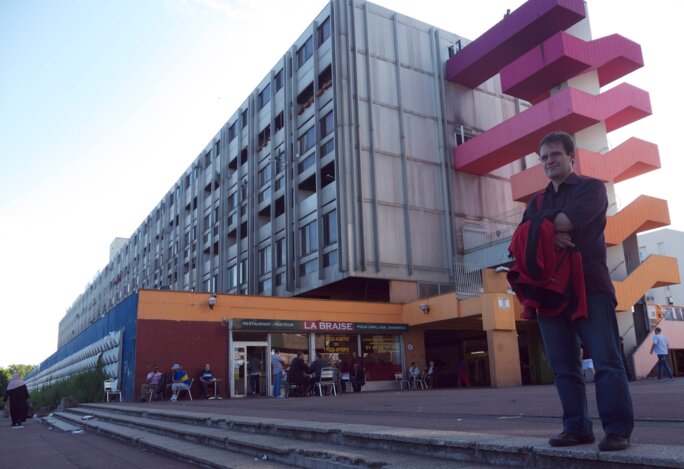
Enlargement : Illustration 7

Darsy said he knew of many examples of unsuccessful attempts by former PSA employees at launching on a new career, including that of taxi driver, hairdresser or chip shop manager. “PSA are closing and encourage us to set up as entrepreneurs,” he said. “If there were career reconversions that were successful in the midst of a crisis, we’d have heard about it.”
'They fetched us from the shanty towns'
As the sun began lowering over the Place du Galion. Wari Bouchikhi, a 54 year-old of Algerian origin, sat at a table in the café and gave vent to his anger at governments past and present. “Everyone knew that Aulnay was going to close, and now everyone is pretending to be astonished, saying ‘it’s incredible’,” he complained. “We’re not taken in.”
For the past 20 years, he has worked as a car park attendant at Roissy-Charles-de-Gaulle airport. Well-known in the neighbourhood, locals call him Tonton, an affectionate nickname meaning ‘uncle’, and before agreeing to talk to Mediapart he made efforts to establish that I was not an undercover police intelligence snooper. “Here, we’ve come to hate the media, especially the cameras,” he said. “They are always taking a swipe at us, only highlighting the bad stuff, the gangsters, never the good, those talents within the estate who create things, who succeed, who take a part in things.”
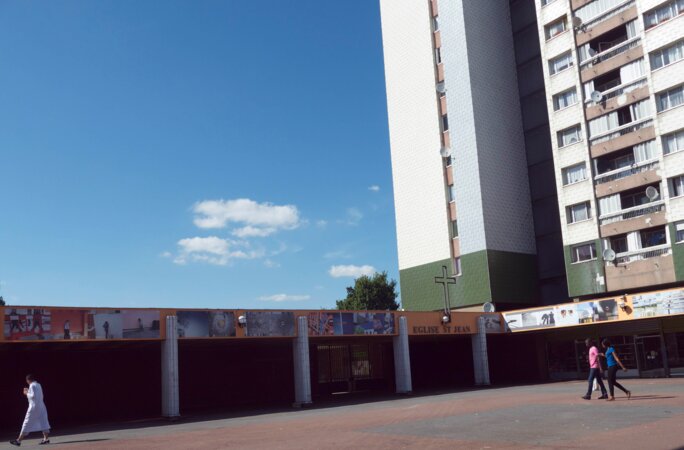
Enlargement : Illustration 8

He spoke of his anger at a France “which built ghettos, blocks along the road to factories”, and also against the late former socialist president François Mitterrand “and the communists” who, he claimed, had “betrayed and shored-up the immigrants and their children”, and towards politicians in general “who come and see us only when it’s time to vote”.
“They closed down classrooms to open prisons and put us inside them,” he fumes. “We are orphans. We don’t have a political family in France.”
His anger, perhaps even rage, was boiling over. He also took a shot at the French anti-racist movement, SOS Racisme, which he claims “left us in the shit behind [its] wonderful slogan ‘Touche pas à mon pote’ [‘leave my mate alone’]”. Surrounded in the café by a crowd of men who are made up of first-generation immigrants, and second- and third-generation children of immigrants, his words met with approval. He rattled off a harsh attack against the regularly-heard official discourses praising the virtues of France’s lay institutions and the integration of foreign cultures within French society, and the 40-year downward spiral of failure of policies to provide decent living standards among France’s banlieues, the deprived suburban housing estates of which the Cité des 3000 is a nationwide symbol.
Bouchikhi, a former amateur boxer and proficient player of the Arab goblet drum, the darbouka, grew up in the Cité des 3000 where he founded the estate’s first local residents’ association, called Fenêtres sur, and its amateur football club, the CSL, whose one-time young players included future French international soccer stars Olivier Dacourt, Alou Diarra and Moussa Sissoko.
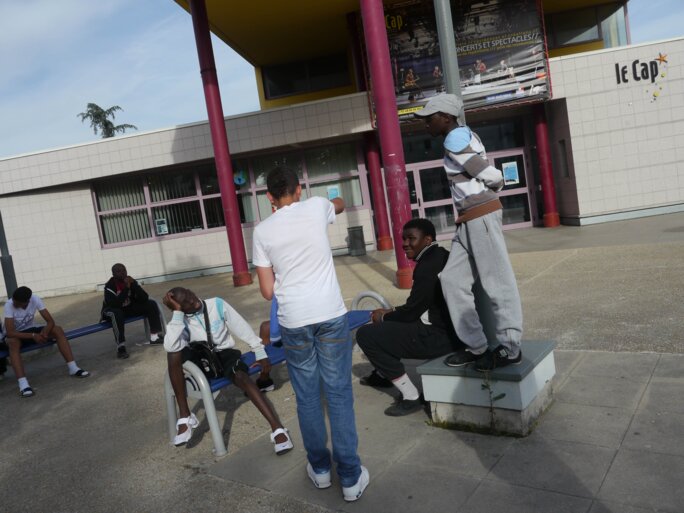
Enlargement : Illustration 9

In the 1980s, Bouchikhi led a group of local residents in waging war on the estate’s drug dealers, a period he described as “the black years” when cocaine and heroin were behind the deaths of several local youths. “The families buried their sons and daughters in silence at the Franco-Muslim cemetery in Bobigny, because drugs and Aids were taboo,” he said. He now lives with his wife and six children in a house situated just a few miles further north.
“It doesn’t affect anyone here if the factory closes, because no-one works,” he joked half-heartedly. Bouchikhi briefly worked at the PSA factory in 1978, when he was employed by Citroên as an on-site transport driver. “I was the only one who turned up in a white suit and shiny shoes,” he said. “It was a form of rebellion, a way of telling them ‘we’re not donkeys’.”
The Cité des 3000 was “a corner of paradise” at that time, he said. “It wasn’t an estate for workers, it was made up of residences dedicated to Citroën managers. The rent for a four-roomed apartment was 4,500 francs [675 euros]. The managers didn’t want any of it. As soon as they could leave to buy a house, they did. That was when they came and fetched us from the shanty towns of [Paris suburbs] Nanterre, Genevilliers and the Blanc-Mesnil.”
“That used to be a Japanese pond, with water lilies,” he said, pointing to a car park opposite the café. “There was a giant Christmas tree on the square. There was a social mix. The Muslims used to buy their meat at the Jewish butcher’s, our neighbours were called [the common white French first name] Denis. In the Galion shopping centre, one of the first in France, we had every public service, foodshops and shoe shops. Now, it’s [Paris neighbourhood] Barbès [1], with Arab and African shops all along. They encouraged us to go ethnic so that we stay amongst ourselves.”
-------------------------
1: Barbès is part of the Goutte d'Or district in northern Paris, a low-income area with a comparatively high immigrant population.
'Failure at school is organized'
Bouchikhi took me to meet up with his friend Abdel-Fatteh Hamzaoui, 38, another former child of the estate who, in 1994, left it behind. On the encouragement of his Algerian parents – his father was a heating installation worker, his mother unemployed – he went to a professional training college in Vincennes, south of Paris.
Hamzaoui recalled how his father told him, “’You’re going to do like my boss did, become a climate-control engineer’”, and how his mother had pushed him to persist with his candidature to enter the college, where he spent several days lobbying the head before he was finally admitted. He had, he claimed, to prove himself “twice as much as an ordinary Frenchman”. That was how he escaped regular school, where, he said, “they wanted me to follow up a technical course, blue-collar training”. His four brothers are also engineers.
Today, married with children, he runs his own climate control installation business and lives in a small village in Picardy, a region he describes as “tough, far-right”, where he built a house painted in “Marrakesh red”. His two boys are in private school, at a cost of 5,000 euros per year.
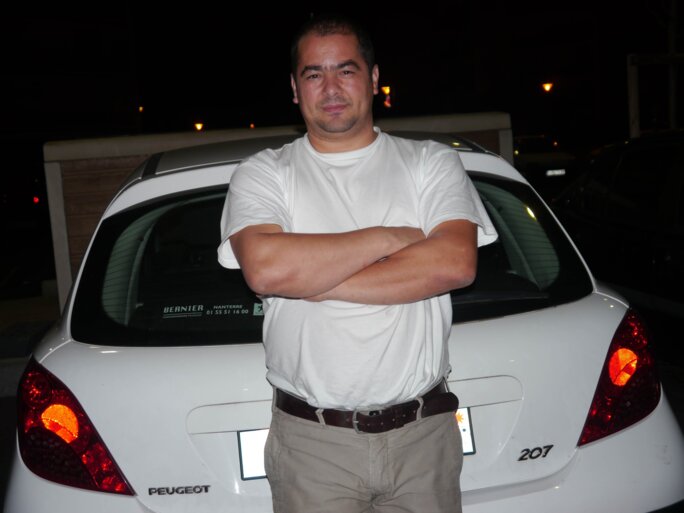
Enlargement : Illustration 10

“At the [Cité des] 3000, you haven’t any future,” he said. “Failure at school is organized, because you need donkeys to break up concrete, to work as binmen, to build roads. Kids are taught vice. At the Victor Hugo [secondary] school in the [Cité des] 3000, when a teacher was absent you’d have to wait three months until he was replaced. I spent four years in premises that were a pre-fab hut. It was supposed to be temporary.”
Hamzaoui gets about most of the time in his company Peugeot 207, “a daily passe-partout” although he owns a Mercedes in which, he said, “you get noticed, constantly pulled over for police checks, because we still don’t have the look of someone who works and can afford a 38,000-euro car”.
“When a factory closes in France, four others are opened elsewhere. Why do the Germans manage alright? Because they have invested in the top-of-the-range and in research, while our researchers at the CNRS [French national scientific research centre] are paid peanuts.”
Hamzaoui, who complains of regularly being made to feel an outsider in France because of his origins, now plans to move his business and family to Morocco. "There, you are told 'please be welcome'. In France, it's the opposite," he said.
-------------------------
English version: Sue Landau and Graham Tearse
(Editing by Graham Tearse)


